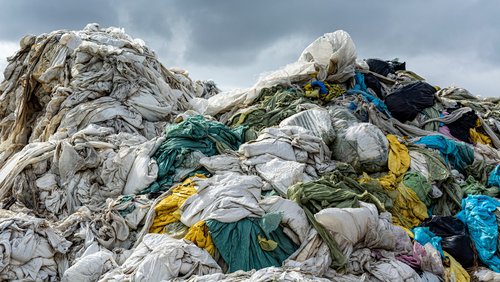Economic potential of textile recycling and hydrogen production from textile waste in Bavaria - Research project
How can hydrogen be produced from textile waste?
As part of the study ‘Economic potential of textile recycling and hydrogen production from textile waste in Bavaria’ sponsored by the Bavarian Ministry of Economic Affairs, the vbw - Bavarian Industry Association (vbw) and the Bavarian Textile and Clothing Industry Association (VTB), various recycling processes were analysed and evaluated.
Minister of Economic Affairs Hubert Aiwanger: ‘Textiles, especially fast fashion, which is produced cheaply and in short cycles, contribute significantly to waste generation. That's why we need economically and ecologically sensible solutions in the field of textile recycling. The study is a pioneering endeavour. It provides an excellent overview of the volume of textile waste and the possibilities for recycling. We now know, for example, that the production of hydrogen from used clothing is currently not profitable. Nevertheless, Bavaria has every chance of becoming a model region for the textile recycling economy. We are also now optimally prepared for the strategy for sustainable and recyclable textiles announced by the EU."
As part of the study, the existing and future mass flows of used textiles were recorded for the first time. The data can help Bavarian companies with investment decisions in used textile processing and the implementation of industrial solutions. A regional analysis confirms that the Augsburg conurbation along the A8 motorway in particular has a favourable infrastructure in terms of waste generation, logistics and research and industrial expertise, and therefore ideal conditions for establishing a textile recycling economy.
Bertram Brossardt, Managing Director of the vbw, emphasises: ‘I see great potential for an economically and ecologically successful circular economy, particularly in the combination of environmental technologies, for example in the area of recycling, and our strengths in automation and artificial intelligence. In this field, the Bavarian economy can once again become a pioneer in terms of sustainability and at the same time increase its competitiveness. However, this requires that the right framework conditions for innovation are consistently created, particularly at EU level."
Managing Director Stefan Satl from the Association of the Bavarian Textile and Clothing Industry adds: ‘The business model of the mainly small and medium-sized companies in the Bavarian textile and clothing industry is generally not geared towards fast fashion, but towards doing business in the most sustainable and resource-conserving way possible.’ With this in mind, the study shows how textile recycling can be established in Bavaria for local companies. In addition to innovative technical concepts and close networking between industry and research, this will require targeted funding measures.
One particular aspect of the study was the question of whether textile waste is suitable for hydrogen production on an industrial scale in Bavaria. Prof Dr Wolfgang Rommel, Managing Director of bifa Umweltinstitut, commented: ‘In relation to the forecast hydrogen demand in Bavaria of 10 terawatt hours per year from 2030, textile waste that cannot be recycled can only make a small contribution of around 0.2 terawatt hours. From today's perspective, it therefore makes little sense to produce hydrogen from textile waste. The framework conditions, in particular the market price for hydrogen, would have to change significantly. Therefore, investments should first be made in modern collection systems and material recycling technologies in order to recycle textile resources. It should not be forgotten that, from an ecological point of view, the avoidance of textile waste must be prioritised. This means, among other things, that textile products must have a longer lifespan, but also that reuse must be strengthened. For this to be economically viable, sustainable sorting technology for clothing textiles is required, which surprisingly does not yet exist."
The study also analysed various processes for recycling textile waste and the technologies used. Prof. Dr. Stefan Schlichter from Augsburg University of Applied Sciences: ‘There are various recycling technologies with very different levels of development that complement each other and can be optimised for specific and concrete areas of application with further research. The knowledge gained in this way can then be used to derive implementation perspectives for the waste disposal industry as well as the textile and clothing industry within the framework of competence centres such as the Recycling Atelier Augsburg."
The research results will be shared with the industry via the TEXTILE INNOVATION network at Bayern Innovativ. For example, the study will be presented at the Textil Innovativ symposium on 18 July 2023 in Augsburg. Members of vbw and VTB will also receive the study. Minister of Economic Affairs Aiwanger: ‘We are taking up the impetus of the study and bringing science, the textile industry and waste management even closer together on the topic of recycling. Together, we want to use the results of the study for innovative solutions in practice."
